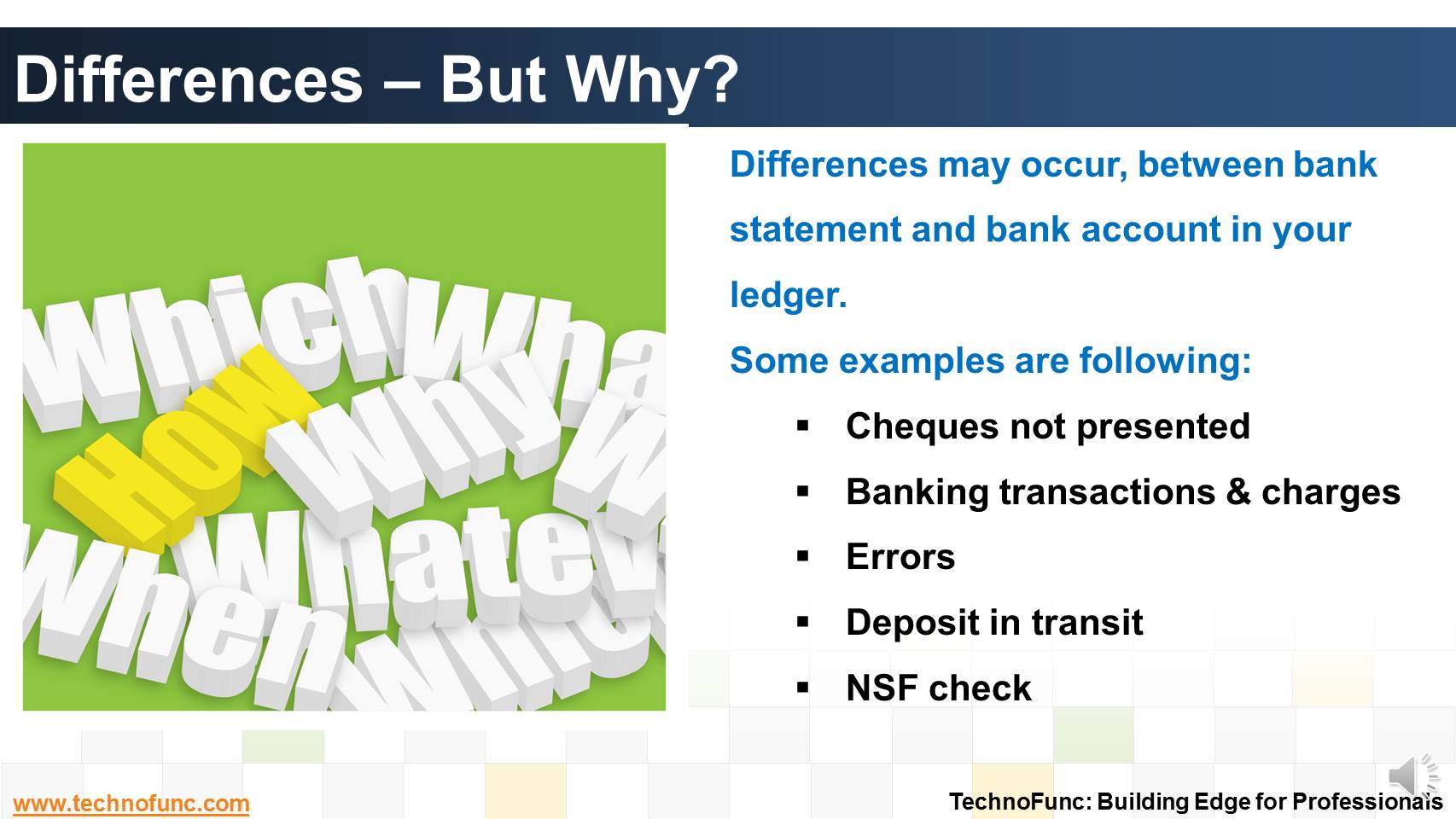- Home
- Business Processes
- Industry Knowledge
- Aerospace Industry
- Automotive Industry
- Banking Domain
- BFSI Industry
- Consumer/ FMCG Industry
- Chemicals Industry
- Engineering & Construction
- Energy Industry
- Education Domain
- Finance Domain
- Hospitality Domain
- Healthcare Industry
- Insurance Domain
- Retail Industry
- Travel and Tourism Domain
- Telecom Industry
- Leadership Skills
- eLearning
- Home
- Business Processes
- Cash Management
- Differences – But Why?
Differences – But Why?
Bank reconciliation process is targeted to validate the bank balance in the general ledger and explain the difference between the bank balance shown in an organization's bank statement. Learn the reasons for existence of differences between the two.
Reason for Differences:
Such differences may occur, for example, due to following reasons:
1. Cheques Not Presented: A cheque or a list of cheques issued by the organization has not been presented to the bank.
2. Banking Transactions: A banking transaction, such as a credit received, or a charge made by the bank, has not yet been recorded in the organization's books.
3. Errors: Either the bank or the organization itself has made an error while recording transactions.
4. Deposit in transit: Cash and/or checks that have been received and recorded by an entity, but which have not yet been recorded in the records of the bank where the entity deposits the funds.
5. NSF check: A check that was not honored by the bank of the entity issuing the check, on the grounds that the entity's bank account does not contain sufficient funds. NSF is an acronym for "not sufficient funds."
Summary:
Differences may occur, between bank statement and bank account in your ledger. Some examples are following:
- Cheques not presented
- Banking transactions & charges
- Errors
- Deposit in transit
- NSF check

Related Links
You May Also Like
-
Have you ever wondered what is actually a Bank Statement and why it is needed. What is the information that is available in a bank statement?
-
The Cash Clearing process enables you to track amounts that have actually cleared your bank. Till reconciliation happens the amounts are parked in 'Cash Clearing Account'.
-
Bank Reconciliation is a PROCESS to Validate the bank balance in the general ledger With Bank Statement. Learn the bank recon process.
-
In automated clearing, Bank statement details are automatically matched and reconciled with system transactions. Learn how this process works and what are the perquisites to enable the same.
-
Account Reconciliation – How? Learn the three key attributes to perfom account reconciliation.
-
Suspense and clearing accounts resemble each other in many respects but there exists important fundamental difference between the two. Read more to explore these differences.
-
What are the various sources of cash in an organization. Which sources increase the cash available with the enterprise and which sources results in outflow of the cash? Let us explore!
-
Effectively using cash management with trade finance products brings tangible benefits to both corporates and financial institutions.Learn the various benefits of cash management process.
-
Treasury Management - Functions
Treasury management has become an specialized function. Treasury function helps in managing the Risk-return profile as well as the tax-efficiency of investment instruments. In larger firms, it may also include trading in bonds, currencies and financial derivatives. Learn about the various tasks, activities and imperatives, undertaken by treasuries in in today's context.
-
Why enterprises need cash management. What is the purpose of having a well defined cash management process?
Explore Our Free Training Articles or
Sign Up to Start With Our eLearning Courses

About Us
Learning
© 2023 TechnoFunc, All Rights Reserved











